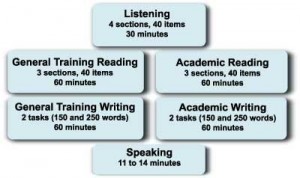This is a test of listening comprehension in the context of general language proficiency. The test is in four sections. The first two sections are concerned with social needs, while the last two are concerned with situations more closely related to educational or training contexts. Texts include both monologues and dialogues between two or three people, and are heard once only. A variety of question types are used for the forty items, including multiple choice, short-answer questions, notes/summary/flow chart completion, sentence completion, labelling a diagram and matching.
IELTS Speaking:
The Speaking module is a structured interview with an emphasis on general speaking skills. It assesses whether candidates have the necessary knowledge and skills to communicate effectively with native speakers of English.
IELTS Reading:
Candidates take either the Academic or the General Training Reading module. The Academic Reading module consists of texts of general interest dealing with issues which are appropriate for, and accessible to, candidates entering postgraduate or undergraduate courses. The texts of the General Training Reading module draw on social and training contexts or deal with general interest topics.
Both Reading modules consist of three passages or sections with forty questions. Question types include multiple choice, sentence or summary completion, identifying data for short-answer questions, matching lists or phrases and identifying writers’ views/attitudes.
IELTS Writing:
Candidates take either the Academic or the General Training Writing module. Appropriate responses for the Academic Writing module are short essays or general reports, addressed to tutors or to an educated non-specialist audience. The General Training Writing module requires candidates to write personal semi-formal or formal correspondence, or to write on a given topic as part of a simulated class assignment.
There are two compulsory tasks. Task 1 requires at least 150 words and Task 2, the more heavily weighted, requires at least 250 words. In Task 1, Academic Writing module candidates are asked to look at a diagram, table or data and to present the information in their own words. Candidates taking the General Training Writing module are asked to respond to a given problem with a letter in Task 1. In Task 2, all candidates are presented with a point of view, argument or problem and asked to provide general factual information, outline and/or present a solution, justify an opinion, and evaluate ideas and evidence.

